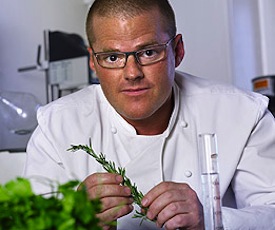The Fat Duck fiasco reached public ears on Feb. 24, 2009, the day celebrity chef Heston Blumenthal decided that because of his “moral feeling” about 40 sick customers, he best close shop, even though he was losing a lot of money and maybe it wasn’t necessary.
 By March 3, 2009, chef Heston declared tests ruled out food poisoning after up to 40 customers reported feeling unwell and that,
By March 3, 2009, chef Heston declared tests ruled out food poisoning after up to 40 customers reported feeling unwell and that,
“It has been awful. We have done our own food testing for the last four years. Everything is tested from the food coming out of the ground, from the farm into the kitchen and to the customer.
"When we started getting telephone calls we took it very seriously. … We’ve had staff tested, some customers tested and so far it is categorically not food poisoning. We are now looking at the possibility of an airborne virus. This could have come from a customer, a staff member not showing symptoms or from outside the restaurant. A customer called me to say they came in with a table of four, three of them got ill, but then their children got ill so they are convinced it is a virus."
At the time I wrote that a lack of positive test results proves nothing. Chapman and I e-mailed each other about the pitfalls of armchair epidemiology. Oh, and I’d be interested to know the nature of those tests for everything. Testing is one of those words that is supposed to make folks sound like they are on top of things – Maple Leaf does thousands of tests – but it’s sorta meaningless in the absence of a protocol.
.jpg) Today the Fat Duck remains closed. The number of sick is now estimated at 400. The Independent reported yesterday that more than 1,000 people face medical checks after health officials widened their investigation into the Fat Duck illness. And the story has gone international.
Today the Fat Duck remains closed. The number of sick is now estimated at 400. The Independent reported yesterday that more than 1,000 people face medical checks after health officials widened their investigation into the Fat Duck illness. And the story has gone international.
The New York Times reports this morning that Britain’s Health Protection Agency is testing the food, testing the people who had become ill and conducting a “risk assessment of all food storage, preparation and cooking processes.” It is testing for bacteria, viruses, patterns in the sick people’s symptoms and in the food they ate and, for good measure, testing other diners, whether or not they got sick.
“… Mr. Blumenthal is perhaps best known for items like snail porridge and “nitro-scrambled egg and bacon ice cream” (served with tea jelly).
His Sound of the Sea dish includes seafood, foam and what some reviewers have called “edible sand.” It is served alongside a conch shell with an iPod in it, so diners can listen to wave and seagull sounds as they eat.
And the individual stories are emerging. Boxing promoter Frank Warren was one of 400 diners who fell ill after dining at the Fat Duck, and said he was "very disappointed" with his treatment after becoming sick following his visit.
"Everything was fabulous about the evening – the food, the setting, the service, it was unbelievably good but unfortunately, afterwards, all of us were ill. … Since then we have not heard anything from the restaurant at all. I am very disappointed and I know that the people I went with are very disappointed with the feedback."
As I’ve already written, check out the staff. And handwashing facilities. And suppliers. And places chefs rarely think to go when it comes to basic microbiology, from farm-to-fork.
And what a fab excuse for a Weezer video, Across the Sea.


.jpg)